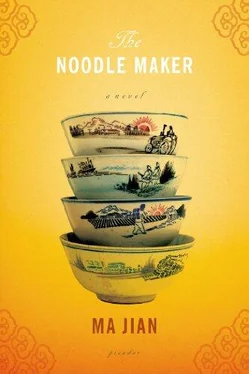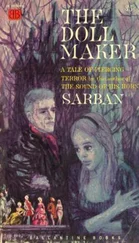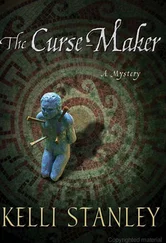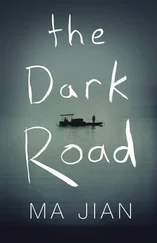He had once hoped to achieve this self-respect through his literary works. His wife, though, a professional novelist, succeeded in confining him to his role as husband, and he quietly entered his fortieth year at his post in the kitchen, surrounded by pots and pans. At first, this ‘househusband’, who was just 1.6 metres tall, tried to leave his daydreams during the brief intervals between washing the dishes and sweeping the floor, and conjure up an elegant phrase or two to jot down onto paper. But he soon gave up on that. Ten years later, he had to accept that all he was capable of was taking a few lines from one of his admirers’ letters and sending them off to another. He knew he was merely the husband of the female novelist, and that any literary talent he’d had in the past was gone for ever.
He came from a family of intellectuals, his father was a doctor, his mother an actress in the local drama troupe. As a young man he had shown some talent. Three of his early poems were published in the China Youth Daily . He wrote an article about the achievements of Zhao Xianjin, a local hero who, like Lei Feng, gave money to the poor and helped old women across the road. It was published in the Guangming Daily , and made him as famous in this town as Zhao Xianjin himself He was transferred from his menial job in a paper factory and placed in charge of propaganda at the People’s Cultural Centre. His good fortune continued to grow. After seeing the Japanese film Peach Blossom about the reunion of a man and wife separated by war, he wrote a story called ‘A Feeling for Home’ about the reunion of a Taiwanese man with his relations in China, and set it in this coastal town.
The story was immediately singled out for praise by the Central Committee’s War Office, as it was very much in tune with their aspirations for national reunification. A film was commissioned, and the Central Committee sent to the town a team of production assistants and advisers, as well as ten actors, two of whom came from abroad. During the few days of filming, he became the most sought-after man in town, and when the municipal leaders bumped into him on the street, their speech took on a deferential tone. Everyone was talking about his script and the ‘visitors from beyond the sky’ that would soon flock to the town. When he walked through the streets, crowds would form behind him, strangers stopped him to say hello as though he were a visiting dignitary. In the evening, his home was surrounded by the same hordes of curious onlookers who loiter outside the big hotels where movie stars stay.
The proof of those glorious days was still in his home: a photograph of himself and the group of visiting actors that included the two foreigners. At the time, it was the only colour photograph in town. Unfortunately the photograph was taken in hospital — he had the misfortune to contract hepatitis just as the film was going into production. He was very flattered that the foreigners paid him a visit. After his meeting with them, he became the town’s authority on all things foreign. When people who had only seen the foreigners from the front or behind, or who had only caught a glimpse of their hair or trousers, started arguing among themselves, someone would always end the dispute by saying, ‘If you don’t believe me, go and ask Old Hep.’ (It was they who coined his nickname.) When the hospital’s director was suspended for claiming that not all foreigners with black hair are mixed race, Old Hep’s photograph saved him, because it clearly showed that one of the foreign actors had jet black hair. Although the authorities demoted him to the less important position of chairman of the operating theatre, they at least allowed him to retain his Party membership.
In that golden year of his, the female novelist — his future wife — sent a love letter to him in hospital. She called him ‘China’s Pavel‘
, after Pavel Gorrchagin, the hero of a Soviet propaganda film. She said he was the sun around which she revolved, the shore on which she longed to moor her boat. It was the first time Old Hep had received a piece of paper inscribed with the petit-bourgeois phrase ‘I love you’. He immediately passed the letter to the head of the Municipal Propaganda Department who had come to visit him in hospital. After a thorough investigation by the Party organs, he was informed that she was the daughter of the political commissar of the local army regiment. In under a week, the Party organs gave Old Hep their permission to embark on a relationship with her. They were also kind enough to return the letter to him, having made sure, of course, to draw a black line through every unhealthy, petit-bourgeois word it contained.
So she started to pay him visits. Had he not been suffering from a fever at the time, Old Hep might have noticed that the skirt she was wearing was identical to the one the actress Zhao Xiaohong had worn on her last visit to the town.
She sat down opposite him, her bare white legs dotted with goosebumps. ‘All the nurses and female visitors seem to be wearing those skirts,’ he remarked.
His future wife replied, ‘These skirts have been around for ages. These days, everyone in the streets is wearing Zhao Dashan’s jacket.’
‘Who’s Zhao Dashan?’ he asked.
‘An actor. You know, the big stocky one.’
‘I can never remember their names,’ Old Hep admitted guiltily.
‘Even my little brother has heard of him!’ She couldn’t forgive Old Hep his ignorance.
Before she left his hospital room, she would always leave a few things behind to ensure that she remained in his thoughts. She left books inscribed with affectionate messages to him, discarded pear cores, the lingering fragrance of her talcum powder, a strand of her hair. He knew she was the daughter of a high-ranking Party cadre, and was overwhelmed by his unexpected stroke of good luck. The great disparity in their social standing inevitably caused him to review his own attributes: he was thirty-six years old, a Party member, earned a monthly salary of forty-seven and a half yuan, and had once been awarded the title of ‘advanced worker’ by his leaders at the paper factory. These details probably meant little to her. He knew that his professional success, however, would impress her more. He was the original screenwriter of the film Feelings for Home; he had managed to get nearly 200,000 words of material published by the China Youth Daily and Guangming Daily; on the strength of years of private study, he had been transferred from his menial job in the paper factory to a cadre’s post in the People’s Cultural Centre; he had driven in the municipal leader’s red-flagged car, and had represented his paper factory on a visit to Beijing to meet the famous model worker, the ‘Iron Man’, Li Guocai. Everyone in town knew about these achievements. Although the female novelist had grown up in a home with five rooms and two toilets, her salary was no higher than his, and besides, she had only visited Beijing once, and that was as a child. Thinking this over in his mind, Old Hep felt a little more at ease. When he inhaled her fragrance in the air after her next visit, he felt a sudden surge of passion, and lying down on his hospital bed, he made up his mind to marry her.
A few months later, Old Hep took her as his wife, and soon after was appointed editor-in-chief of the Cultural Centre’s new bi-monthly literary magazine. He had reached the peak of his career. But his luck was not to last, and in less than two years, his wife quickly caught up with him. Two of her novels were published by the most respected national journals, and she was suddenly proclaimed a ‘regional and municipal talent’. She made visits to Beijing and Huangshan for two separate literary festivals. The month she and Old Hep were invited to join the newly established Literary Union, she alone was chosen by the authorities to be the town’s first ‘professional writer’. The government paid her a monthly salary so that she could stay at home all day writing novels. This turn of events didn’t suit Old Hep at all. His wife stopped referring to him as ‘China’s Pavel’, and started calling him Old Hep like everyone else. She made contact with other professional writers around the country, and became an authority on the latest cultural developments. She knew the name of the girlfriend of the Beijing writer Tan Fucheng, and was aware that the novelist Li Tiesheng had a paralysed leg. When the Open Door Policy was launched, she proved to be a fearless trailblazer of reform. She was the first woman in town to wear a padded bra, dye her hair and perm it like a foreigner. She read the daringly realist novel Form Teacher by Liu Xinwu, and the literary journal Today that was sent down to her from Beijing. She also took to composing romantic, melancholy verse. By the time Old Hep had finally managed to write the word ‘love’ down on a piece of paper, she was already using phrases like ‘sexually aroused’. She corresponded with various young Beijing poets, sent them affectionate cards, and in return received letters in which they addressed her as ‘my little lamb’, ‘my far-away treasure’, and ‘the angel wafting through my dreams’. She was completely in step with the fast pace of reform.
Читать дальше












